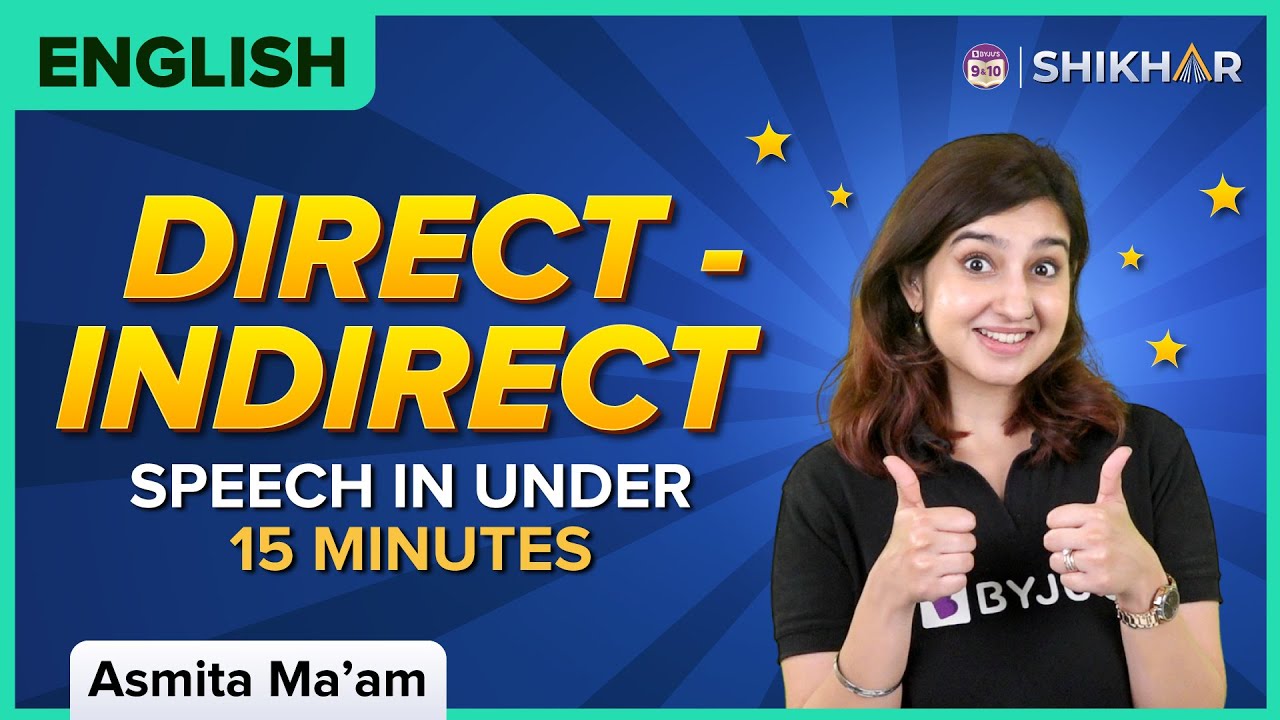Learn English Grammar: INDIRECT SPEECH (REPORTED SPEECH)
Summary
TLDRIn this educational video, Emma and her sister Audra explore the concept of reported speech, also known as indirect speech. They demonstrate how to convert direct speech into reported speech by altering verb tenses and sentence structures. Through various examples, they highlight the importance of changing present tenses to past and 'will' to 'would' in reported speech. Emma encourages viewers to practice this skill and offers additional learning resources on her channel.
Takeaways
- 🗣️ Direct speech is when we use someone's exact words, enclosed in quotation marks.
- 📣 Reported or indirect speech is used to convey what someone said to others, often changing the tense and structure of the original statement.
- 🕒 When reporting speech, present tenses usually shift to past tenses to reflect the reporting action.
- 🔄 The auxiliary verbs in direct speech (like 'am', 'is', 'are') become past tense ('was', 'were') in reported speech.
- 👉 The present perfect tense 'have/has + past participle' changes to 'had + past participle' in reported speech.
- 📉 The simple past tense in direct speech becomes the past perfect ('had + past participle') when reported.
- 🔮 Future tense with 'will' in direct speech is converted to 'would' in reported speech to indicate a past intention or future in the past.
- 📚 The video provides examples and practice for changing various verb tenses from direct to reported speech.
- 💡 It's advised to practice with verb tenses you are comfortable with before moving on to more complex ones.
- 📝 The video concludes with a recommendation to practice reported speech using quizzes and subscribing to the channel for more learning resources.
Q & A
What is the main topic of the video script?
-The main topic of the video script is reported speech, also known as indirect speech, which is a way of conveying someone else's spoken words.
Who are the two main speakers in the script?
-The two main speakers in the script are Emma, who is teaching about reported speech, and her sister Audra, who helps demonstrate the concept.
What is the difference between direct speech and reported speech?
-Direct speech is the exact words someone says, enclosed in quotation marks, while reported speech is a way to convey what someone said to others, using past tense and changing the sentence structure accordingly.
Can you provide an example of direct speech from the script?
-An example of direct speech from the script is when Audra says, 'My name is Audra.'
How does Emma demonstrate the conversion from direct speech to reported speech?
-Emma demonstrates the conversion by changing Audra's direct speech, 'My name is Audra,' to reported speech as, 'She told me her name was Audra.'
Why do verb tenses change when converting from direct speech to reported speech?
-Verb tenses change to reflect the fact that the reporting of the speech is happening after the original speech, thus making the original present tense shift to the past tense.
What happens to the present perfect tense when it is converted to reported speech?
-The present perfect tense changes to the past perfect tense in reported speech. For example, 'I have been' becomes 'She had been.'
How does Emma suggest practicing reported speech?
-Emma suggests practicing by first learning the verb tenses you already know and focusing on changing those sentences into reported speech.
What is the advice given for dealing with complex tenses in reported speech?
-Emma advises to ignore complex tenses like the present perfect if you're not familiar with them, and focus on simpler tenses first.
What resource does Emma recommend for further practice on reported speech?
-Emma recommends trying a quiz at www.engvid.com for further practice on reported speech.
How does Emma conclude the lesson on reported speech?
-Emma concludes the lesson by thanking the viewers for watching, encouraging them to practice and subscribe to her channel for more learning resources, and promising more content in future videos.
Outlines

This section is available to paid users only. Please upgrade to access this part.
Upgrade NowMindmap

This section is available to paid users only. Please upgrade to access this part.
Upgrade NowKeywords

This section is available to paid users only. Please upgrade to access this part.
Upgrade NowHighlights

This section is available to paid users only. Please upgrade to access this part.
Upgrade NowTranscripts

This section is available to paid users only. Please upgrade to access this part.
Upgrade NowBrowse More Related Video

Can you use REPORTED SPEECH? Grammar Lesson + Examples

REPORTED SPEECH | INDIRECT SPEECH | DIRECT SPEECH - statements, questions, commands

Direct - Indirect (Reported) Speech in Under 15 Minutes | Class 9 and 10 | English | BYJU'S

BAHASA INGGRIS SMA - Reported Speech (Indirect & Direct Speech) | GIA Academy

Word Order - Indirect & Reported Questions | English Grammar Lesson | Part 2 | C1-Advanced

BELAJAR DIRECT AND INDIRECT SPEECH (REPORTED SPEECH)
5.0 / 5 (0 votes)